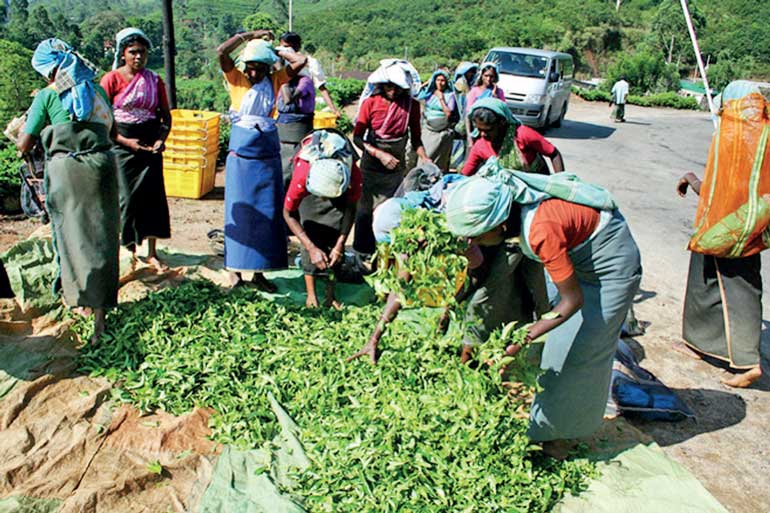Sunday Feb 15, 2026
Sunday Feb 15, 2026
Wednesday, 12 January 2022 00:00 - - {{hitsCtrl.values.hits}}

 Should optimise assets, not limit themselves to being solely agriculture businesses
Should optimise assets, not limit themselves to being solely agriculture businesses
Over the past three decades, the Regional Plantation Companies (RPCs) have established themselves as a critical stakeholder of Sri Lanka’s plantation industry.
The RPCs were formed in 1992, primarily with the intention of bringing in the private sector, to improve the efficiency of the country’s large-scale estates involved in the cultivation of tea, rubber and other plantation crops. However, it is evident that the RPCs have gone beyond this mandate and that their actions have elevated Sri Lanka’s entire plantation sector.
This is evidenced by the numerous global certifications obtained by the RPCs, which have been critical in enabling Ceylon Tea to earn a premium over its competitors in the international market. The RPCs also contribute significantly to the country’s economy, both as a major employer and a generator of export earnings.
However, the RPCs are now facing challenges on multiple fronts. It is evident that the RPCs cannot focus solely on the production of commodities, especially given Sri Lanka’s high production costs. To be financially sustainable and to continue to contribute to the country’s economy, RPCs must adopt a different business model.
In order to do so, firstly, RPCs must no longer see themselves as being solely agriculture businesses nor should they limit themselves to the plantation sector alone. They should instead diversify in a manner that optimises the economic benefit of the assets under their management. Many forward-thinking RPCs were quick to come to this realisation, diversifying into sectors like renewable energy, other profitable plantation crops and commercial forestry, as far back as early 2000s.
RPC-led vertical and horizontal integration
The RPCs must consider the feasibility of both horizontal and vertical integration, as well as product and market diversification. Prudent use of this approach has already yielded lucrative dividends for several RPCs. For instance, some have diversified within the plantation sector, successfully tapping into the high-value market for spices. Others have diversified into other industries, with many RPCs investing in hydro and solar energy projects.
The RPCs should also think out-of-the-box in these instances. For example, my company, Elpitiya Plantations PLC, partnered with a foreign company, to develop a state-of-the art adventure park as well as to cultivate and market strawberries. We are also testing the feasibility of growing several other types of berries in Sri Lanka, given the lucrative market for the product. Similarly, we are also establishing cultivations for hass avocado, which has a relatively long shelf life and hence is suitable for exports, pineapple and as well as bamboo – both edible types and those which can be used for fabric production.
Such diversification is vital to improve long-term business sustainability and avoid the proverbial risk of ‘putting all eggs in one basket’. These are strategies which will not only benefit RPCs but also their employees and the wider economy. Diversification would create new employment opportunities which are more aligned with the aspirations of the youth, who do not wish to engage in tea plucking or other similar activities. Addition of new high-value exports can assist in diversifying Sri Lanka’s export portfolio, which has been largely stagnant.
In addition to diversification, adoption of mechanisation is also important, particularly in addressing the labour shortage and high production costs in RPC estates. While mechanical harvesting cannot be used in all areas, given especially that many tea fields are located on elevations/slopes, the RPCs are cultivating new tea fields in a manner that would make them well-suited for mechanised plucking. Besides plucking, mechanisation has been used widely in field activities to overcome labour shortage and to increase productivity.
Broad stakeholder collaboration essential
RPCs cannot make such sweeping changes unilaterally. We require the total support of policymakers and all industry stakeholders – including the trade unions and local politicians. We must work together to develop a visionary framework for these reforms. Crucially, these measures must also be presented to employees, and the general public, so that further reforms are undertaken on the basis of an informed majority consensus.
Policy consistency is critical to enable the RPCs to make business decisions with confidence. This has been an area of concern in the recent past – particularly in terms of policies on importation and usage of agro-chemicals, synthetic fertilisers and the cultivation of oil palm.
In the case of oil palm, RPCs invested at the invitation of the authorities and committed significant funds for this purpose. However, just a few short years later, new cultivations were banned by a similar regime to the one which first enthusiastically sanctioned them. To date, no clear scientific evidence has been made public to substantiate the decision.
Similarly, the RPCs also faced severe setbacks as a result of the decision to switch to organic agriculture. Due to unavailability of fertiliser and other agrochemicals, quality and volumes of produce are set to decline. While the RPCs do not object to the idea of organic cultivation, these policies have been roundly acknowledged to have been totally lacking in terms of a systematic plan for implementation, or even a basic testing of viability through pilot projects.
Significant policy changes being made overnight, without any consultation of stakeholders can never account for ground realities, and thus they deter investor confidence, particularly in launching new ventures.
The estate sector trade unions and ground-level politicians have also at times objected to diversification. While these objections may appear to be due to concerns over the potential for loss of livelihoods, these concerns are misplaced. No RPC would use a cultivated extent for an economically unviable purpose. The financial success of diversifications undertaken so far provides clear evidence of this fact. Resistance to diversification is therefore more due to a broader reluctance to adapt and stick with ‘business-as-usual’. At a time when the fate of the entire industry hangs in the balance, we can no longer afford such complacency.
Evidence from diversification carried out thus far instead indicates that these efforts often create better employment opportunities and prospects for employees. For instance, in the case of berry cultivation, the employees are paid on a monthly basis, as opposed to the daily wage system which prevails in tea. They also earn an income significantly higher than a majority of workers involved in tea plucking.
Enhancing productivity
On the subject of employee remuneration, it is also important to note that it is natural for all employees to expect salary increments. While such increments are necessary – particularly in the backdrop of soaring inflation – RPCs simply cannot afford to do so under the current daily wage model. The RPCs produce commodities which are highly price-sensitive and for which many competitors exist in the global market.
If, instead, remuneration is linked with productivity, which unfortunately cannot be implemented due to opposition from trade unions, the employees could earn significantly higher incomes than they do at present. This would be a win-win, since the RPCs too would benefit from increased productivity and production.
Hence, the unions and local politicians must understand the economic realities and assist in communicating these dynamics to workers, if RPCs are to undertake the required reforms. These are critical in ensuring that the sector is able to survive the volatility that we are currently experiencing, and over the medium-long term, move towards more economically sustainable models.
Public support is also necessary to overcome the social stigma associated work in the plantation industry, and especially with work in tea estates, in order for the RPCs to both retain and attract employees. While the RPCs have taken significant efforts to provide dignified employment, for example by providing uniforms and new designations to employees, providing decent living standards and by communicating the value of their work to the nation and to each RPC, these changes are yet to be reflected in wider society.
In addition, RPCs must be able to reap the benefits of their efforts. Currently, while the sector, being an export industry, has benefited from the depreciation of the Sri Lankan Rupee, these benefits have been absorbed by intermediaries in the value chain at the expense of RPCs. RPCs, through their representative industry body – the Planters’ Association of Ceylon – have raised this issue with the authorities and are hopeful of a positive outcome.
(About the Author: A veteran with more than three decades of experience in the plantation sector, Bhathiya Bulumulla is the Chairman of the Planters’ Association of Ceylon. He is also a Director and the CEO of Elpitiya Plantations PLC.)